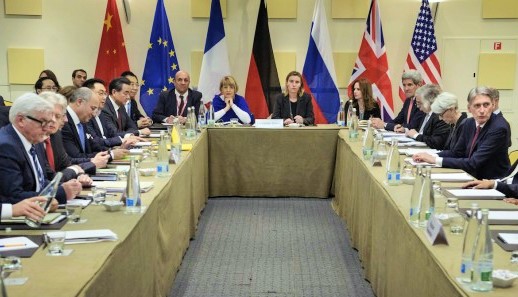The Nuclear deal between the Iran and six major world powers including the US, China, the UK, France, Germany and Russia emerged as a breakthrough on 2nd April 2015. The main objective of the negotiations was to restrict Iran’s nuclear plans. After eight days of continuous negotiations in Switzerland, the Iran nuclear deal finally reached a framework. The deal states that the Western powers will remove their sanctions from Iran if it remains transparent about its nuclear ambitions. The enlisting of the full agreement has already been started and will be finished prior to the deadline of 30 June 2015.
However, the Israeli Prime Minister Benjamin Netanyahu has criticized the nuclear agreement stating it to be a threat for Israel. Mr. Netanyahu considers that Iran might create a nuclear bomb which will be a danger for the Jewish state, Israel. On the other side, streets of Iran were filled with people celebrating the news of nuclear deal. This was an expression of public’s hopes that the agreement will bring an end to the International restriction over Iran’s economy.
The nuclear deal outlined that Iran will have to close more than two-third of its centrifuges that possess the capacity to produce uranium which can be utilized to build a nuclear bomb. Besides, they will be required to dismantle a reactor that might produce plutonium. One of the most critical point raised in the negotiation was that the research and development in Iran will be limited. Moreover, Iran agreed to shift its 1,000 second generation centrifuges that are presently installed at Natanz to International Atomic Energy Agency for a period of 10 years. And if Iran complies with all the terms of final agreement, then the nation will be gradually relieved from the US and EU sanctions. However, the sanctions related to the proliferation will remain intact.
Moreover, Iran will be under strong monitoring by the International Atomic Energy Agency to make sure that the country does not violate any terms of the agreement. The restrictions over Iran are divided into different phases. While some of the provisions will be applicable for 10, 15 or even 25 years and the others will continue forever. In case Iran failed to meet any of the terms, the economic and financial sanctions will be again be reinstated.
The Iran nuclear deal has not been signed as of now and the essential details need to be worked out. The deal is expected to cut down Iran’s uranium stocks by 98% and thereby limit its development activities. Enriched uranium is utilized for making of nuclear weapons. This activity was covered by Iran from the rest of the world for almost 18 long years.
Meanwhile, the Gulf Arab states were silent about the nuclear agreement. However it was disclosed that the reaction will soon come from the Gulf Cooperation Council (a group of Saudi Arabia, Kuwait, the United Arab Emirates, Qatar, Bahrain and Oman) as a whole and not from individual nations. It is believed that he finalization of this agreement will provide a peaceful solution for potential International threat. This arrangement indicates that if Iran adheres to the rules, the Iran’s nuclear program will be absolutely peaceful.
However, the Israeli Prime Minister Benjamin Netanyahu has criticized the nuclear agreement stating it to be a threat for Israel. Mr. Netanyahu considers that Iran might create a nuclear bomb which will be a danger for the Jewish state, Israel. On the other side, streets of Iran were filled with people celebrating the news of nuclear deal. This was an expression of public’s hopes that the agreement will bring an end to the International restriction over Iran’s economy.
The nuclear deal outlined that Iran will have to close more than two-third of its centrifuges that possess the capacity to produce uranium which can be utilized to build a nuclear bomb. Besides, they will be required to dismantle a reactor that might produce plutonium. One of the most critical point raised in the negotiation was that the research and development in Iran will be limited. Moreover, Iran agreed to shift its 1,000 second generation centrifuges that are presently installed at Natanz to International Atomic Energy Agency for a period of 10 years. And if Iran complies with all the terms of final agreement, then the nation will be gradually relieved from the US and EU sanctions. However, the sanctions related to the proliferation will remain intact.
Moreover, Iran will be under strong monitoring by the International Atomic Energy Agency to make sure that the country does not violate any terms of the agreement. The restrictions over Iran are divided into different phases. While some of the provisions will be applicable for 10, 15 or even 25 years and the others will continue forever. In case Iran failed to meet any of the terms, the economic and financial sanctions will be again be reinstated.
The Iran nuclear deal has not been signed as of now and the essential details need to be worked out. The deal is expected to cut down Iran’s uranium stocks by 98% and thereby limit its development activities. Enriched uranium is utilized for making of nuclear weapons. This activity was covered by Iran from the rest of the world for almost 18 long years.
Meanwhile, the Gulf Arab states were silent about the nuclear agreement. However it was disclosed that the reaction will soon come from the Gulf Cooperation Council (a group of Saudi Arabia, Kuwait, the United Arab Emirates, Qatar, Bahrain and Oman) as a whole and not from individual nations. It is believed that he finalization of this agreement will provide a peaceful solution for potential International threat. This arrangement indicates that if Iran adheres to the rules, the Iran’s nuclear program will be absolutely peaceful.





